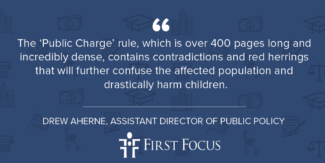
The Department of Homeland Security (DHS) recently published a proposed rule on the Federal Register that would drastically change the guidelines for applying to enter the country or for a change of residency status. The “Public Charge” rule, which is over 400 pages long and incredibly dense, contains contradictions and red herrings that will further confuse the affected population and drastically harm children.
One example is the deceptive way DHS delineates how this rule will impact children who participate in important assistance programs. On page 51175, the rule establishes that the receipt of public benefits by children will not be considered in the public charge determination of their parent: “DHS notes that while the number of children, including U.S. citizen children, may count towards an alien’s household size for purposes of determining inadmissibility on the public charge ground, the direct receipt of public benefits by those children would not factor into the public charge inadmissibility.”
On its face, the rule claims to exempt children’s use of benefits because they won’t factor into the cost-benefit analysis of their parent’s admissibility. However, this is not the whole story. That is because DHS is considering penalizing children for using benefits when they themselves apply for a green card once they turn 18, saying on page 51174, “because the public charge inadmissibility determination is a prospective determination in the totality of circumstances, the circumstances surrounding an alien’s receipt of public benefits as a child, including the age at which such benefits were received, are a relevant consideration.”
Exempting a child’s use of benefits in their parents’ public charge determination signals that it is allowable for parents to enroll their children in much-needed programs for which they are legally eligible. DHS, however, is considering punishing those same children if they themselves are immigrants eventually hoping to receive a green card. This discrepancy is misleading and harmful. If implemented, this aspect of the rule would leave parents with the excruciating decision between forgoing essential benefits for their children or endangering their ability to become a Legal Permanent Resident in adulthood. On top of this, the complexity of the rule may mean parents are unaware that their child’s future status could be jeopardized by the use of housing, health care, and nutrition assistance. Cutting off a child from necessary benefits through scare tactics or denying them a fair path to permanent residency because of help they receive as children hurts our country’s future workers, leaders, and tax base, who we are going to rely on for years to come.
First Focus strongly opposes this deceptive consideration, the rule as a whole, and its harmful repercussions on children and the country as a whole. We urge individuals and organizations to comment in opposition.